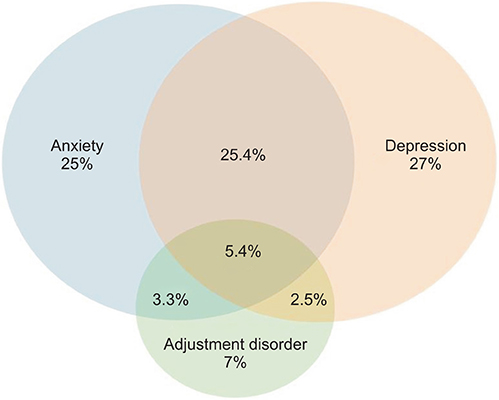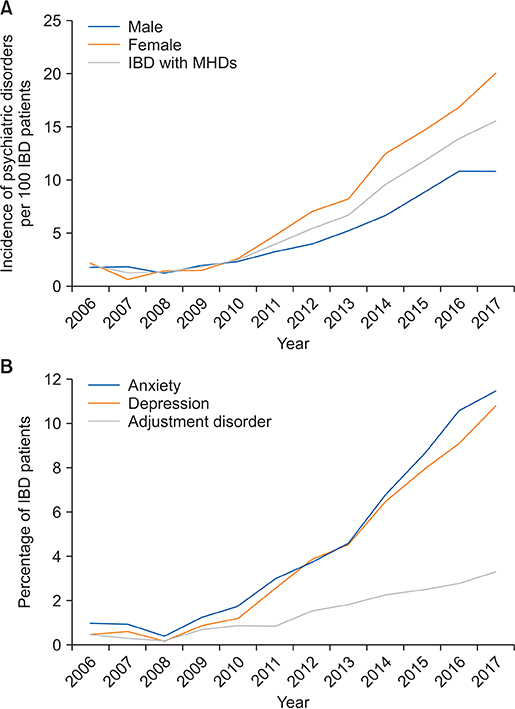Pediatr Gastroenterol Hepatol Nutr.
2019 Nov;22(6):527-535. 10.5223/pghn.2019.22.6.527.
Burden of Psychiatric Disorders among Pediatric and Young Adults with Inflammatory Bowel Disease: A Population-Based Analysis
- Affiliations
-
- 1Department of Pediatrics, Case Western Reserve University (Metro Health) Program, Cleveland, OH, USA. aravindjt@gmail.com
- 2Department of Pediatric Gastroenterology, Case Western Reserve University (Metro Health) Program, Cleveland, OH, USA.
- KMID: 2462092
- DOI: http://doi.org/10.5223/pghn.2019.22.6.527
Abstract
- PURPOSE
There is increasing prevalence of psychiatric disorders among inflammatory bowel Disease (IBD) population. Further, presence of psychiatric disorders has been shown as an independent predictor of quality of life among patients with IBD. We intended to explore the prevalence of various psychiatric disorders among pediatric and young adult population with IBD as a population-based analysis.
METHODS
We did a retrospective case control analysis using a deidentified cloud-based database including health care data across 26 health care networks comprising of more than 360 hospitals across USA. Data collected across different hospitals were classified and stored according to Systematized Nomenclature of Medicine-Clinical Terms. We preidentified 10 psychiatric disorders and the queried the database for the presence of at least one of the ten psychiatric disorders among IBD patients between 5 and 24 years of age and compared with controls.
RESULTS
Total of 11,316,450 patients in the age group between 5 and 24 years and the number of patients with a diagnosis of IBD, Crohn's disease or ulcerative colitis were 58,020. The prevalence of psychiatric disorders was 21.6% among IBD mainly comprising of depression and anxiety disorder. Multiple logistic regression analysis showed, IBD is 5 times more likely associated with psychiatric disorders than controls, p<0.001). We showed a steady increasing trend in the incidence of psychiatric disorders among IBD patients (2% in 2006 to 15% in 2017).
CONCLUSION
Largest population-based analysis demonstrated an increased prevalence of psychiatric disorders among IBD patients. Our study emphasizes the need for psychological and mental health services to be incorporated as a part of the routine IBD clinic.
Keyword
MeSH Terms
Figure
Reference
-
1. Molodecky NA, Soon IS, Rabi DM, Ghali WA, Ferris M, Chernoff G, et al. Increasing incidence and prevalence of the inflammatory bowel diseases with time, based on systematic review. Gastroenterology. 2012; 142:46–54.e42. quiz e30.
Article2. Engelmann G, Erhard D, Petersen M, Parzer P, Schlarb AA, Resch F, et al. Health-related quality of life in adolescents with inflammatory bowel disease depends on disease activity and psychiatric comorbidity. Child Psychiatry Hum Dev. 2015; 46:300–307.
Article3. Guthrie E, Jackson J, Shaffer J, Thompson D, Tomenson B, Creed F. Psychological disorder and severity of inflammatory bowel disease predict health-related quality of life in ulcerative colitis and Crohn's disease. Am J Gastroenterol. 2002; 97:1994–1999.
Article4. Bussing R, Halfon N, Benjamin B, Wells KB. Prevalence of behavior problems in US children with asthma. Arch Pediatr Adolesc Med. 1995; 149:565–572.
Article5. Anie KA. Psychological complications in sickle cell disease. Br J Haematol. 2005; 129:723–729.
Article6. Lavigne JV, Faier-Routman J. Psychological adjustment to pediatric physical disorders: a meta-analytic review. J Pediatr Psychol. 1992; 17:133–157.
Article7. Cadman D, Boyle M, Szatmari P, Offord DR. Chronic illness, disability, and mental and social well-being: findings of the Ontario Child Health Study. Pediatrics. 1987; 79:805–813.
Article8. Szigethy E, Levy-Warren A, Whitton S, Bousvaros A, Gauvreau K, Leichtner AM, et al. Depressive symptoms and inflammatory bowel disease in children and adolescents: a cross-sectional study. J Pediatr Gastroenterol Nutr. 2004; 39:395–403.
Article9. Greenley RN, Hommel KA, Nebel J, Raboin T, Li SH, Simpson P, et al. A meta-analytic review of the psychosocial adjustment of youth with inflammatory bowel disease. J Pediatr Psychol. 2010; 35:857–869.
Article10. Rufo PA, Denson LA, Sylvester FA, Szigethy E, Sathya P, Lu Y, et al. Health supervision in the management of children and adolescents with IBD: NASPGHAN recommendations. J Pediatr Gastroenterol Nutr. 2012; 55:93–108.
Article11. Mackner LM, Greenley RN, Szigethy E, Herzer M, Deer K, Hommel KA. Psychosocial issues in pediatric inflammatory bowel disease: report of the North American society for pediatric gastroenterology, hepatology, and nutrition. J Pediatr Gastroenterol Nutr. 2013; 56:449–458.12. Chute CG. Clinical classification and terminology: some history and current observations. J Am Med Inform Assoc. 2000; 7:298–303.
Article13. Reichenberg A, Yirmiya R, Schuld A, Kraus T, Haack M, Morag A, et al. Cytokine-associated emotional and cognitive disturbances in humans. Arch Gen Psychiatry. 2001; 58:445–452.
Article14. Hamilton MJ, Snapper SB, Blumberg RS. Update on biologic pathways in inflammatory bowel disease and their therapeutic relevance. J Gastroenterol. 2012; 47:1–8.
Article15. Mikocka-Walus A, Pittet V, Rossel JB, von Känel R. Swiss IBD Cohort Study Group. Symptoms of depression and anxiety are independently associated with clinical recurrence of inflammatory bowel disease. Clin Gastroenterol Hepatol. 2016; 14:829–835.e1.16. Walter JG, Kahn SA, Noe JD, Schurman JV, Miller SA, Greenley RN. Feeling fine: anxiety and depressive symptoms in youth with established ibd. Inflamm Bowel Dis. 2016; 22:402–408.17. Mittermaier C, Dejaco C, Waldhoer T, Oefferlbauer-Ernst A, Miehsler W, Beier M, et al. Impact of depressive mood on relapse in patients with inflammatory bowel disease: a prospective 18-month follow-up study. Psychosom Med. 2004; 66:79–84.
Article18. Walker JR, Ediger JP, Graff LA, Greenfeld JM, Clara I, Lix L, et al. The Manitoba IBD cohort study: a population-based study of the prevalence of lifetime and 12-month anxiety and mood disorders. Am J Gastroenterol. 2008; 103:1989–1997.
Article19. Clark JG, Srinath AI, Youk AO, Kirshner MA, McCarthy FN, Keljo DJ, et al. Predictors of depression in youth with Crohn disease. J Pediatr Gastroenterol Nutr. 2014; 58:569–573.
Article20. Byrne G, Rosenfeld G, Leung Y, Qian H, Raudzus J, Nunez C, et al. Prevalence of Anxiety and Depression in Patients with Inflammatory Bowel Disease. Can J Gastroenterol Hepatol. 2017; 2017:6496727.
Article21. Neuendorf R, Harding A, Stello N, Hanes D, Wahbeh H. Depression and anxiety in patients with inflammatory bowel disease: a systematic review. J Psychosom Res. 2016; 87:70–80.
Article22. Addolorato G, Capristo E, Stefanini GF, Gasbarrini G. Inflammatory bowel disease: a study of the association between anxiety and depression, physical morbidity, and nutritional status. Scand J Gastroenterol. 1997; 32:1013–1021.
Article23. Bernstein CN, Hitchon CA, Walld R, Bolton JM, Sareen J, Walker JR, et al. CIHR team in defining the burden and managing the effects of psychiatric comorbidity in chronic immunoinflammatory disease. increased burden of psychiatric disorders in inflammatory bowel disease. Inflamm Bowel Dis. 2019; 25:360–368.
Article
- Full Text Links
- Actions
-
Cited
- CITED
-
- Close
- Share
- Similar articles
-
- Rising Burden of Psychiatric and Behavioral Disorders and Their Adverse Impact on Health Care Expenditure in Hospitalized Pediatric Patients with Inflammatory Bowel Disease
- Update on the epidemiology of inflammatory bowel disease in Asia: where are we now?
- Pediatric Crohn's Disease presenting as Severe Constipation and Abdominal Distension
- Pediatric-onset Inflammatory Bowel Disease: What Are Different from Adult in the Treatment?
- Inflammatory Bowel Disease in Pediatric Age




